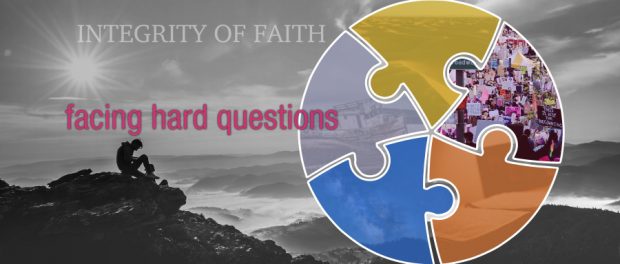Facing Hard Questions – Making Sure I Truly Believe What I Believe

I wrote last week about the flawed sense of identity and distorted application of the concept of human depravity to my own life. God’s grace was powerful, but I effectively saw my own weakness as (in a way) even more powerful.
Eventually, as I began to face the hard questions that challenged my faith and my theology, my paradigm began to shift. Of course, I’d heard all the hard questions before…
- How can an all-powerful, all-loving God let such evil exist in the world?
- Why can’t the Bible answer for the scientific discoveries in recent decades?
- When should we leverage politics to advance our religious ideals?
- What makes the Bible the only correct holy book?
- Where do non-Christians go after dying, and what do they experience?
I lived in a binary world.
For most of my Christian walk to this point, I found these subject matter issues easy enough to deal with in clear-cut black-and-white manners. I lived in a binary world.
- Gender Roles – Men are the head of women, and if that sounds misogynistic, take it up with God.
- Rape – This is a violent and unacceptable act. Period.
- Abortion – This is murdering defenseless children, and so it must stop.
- Lust – Jesus said it’s adultery. So men should never look at women’s bodies. Ever.
- Homosexuality – The Bible says it’s sin, so they’re going to Hell if they don’t change.
- Domestic Abuse – It’s terrible, but not an allowable reason for divorce.
In such a black-and-white, binary world, I had a ready answer for any of the political discussions that might arise. I could sound well-informed. But the hard questions, the fundamental questions (most of which I really couldn’t have put to words), generally escaped me. For the most part, I took the teachings of my church experiences and evangelical culture as gospel, even if they didn’t sit right.
The theology I held to didn’t always pass the sniff test, but I kept it anyway.
I mean, who has time to really ponder those sorts of things?
Taking Time to Reflect
Eventually, my trip to prison served as something of a catalyst, as it gave the adult version of me time to research and soul search in a way the teenage version of me never could.
My youthful energy having waned enough to let me focus, and my life experiences having tempered much of my arrogance, I entered this season with a more open and agile mind than ever before. And suddenly I had time to read.
And I read.
One has to be cautious in the microcosm of prison, as genuinely heretical religious teachings are immediately available and enthusiastically advanced by some inmates. However, with a guard up, one can wrestle with challenging issues in a very authentic manner.
As a rationally-oriented guy, I relished the chance to deal with some of the things that had bothered me for years. For the first time in my life, I openly faced the hard questions.
And I got answers.
And more questions.
And more answers.
And more questions.
Do you see the pattern?
A Scientific Pattern
It’s not unlike science. If you’re fascinated by history, scientific conjecture, and a general insight into the incompetence of man (and can tolerate potential slights on your belief system), I highly recommend reading Bill Bryson’s A Short History of Nearly Everything. In this abbreviated form, you see how frequently humanity thinks its grip firm on the cosmos, our planet, our history, or even our own bodies.
Every time we answer a question in science, it reveals a bevy of unanswered questions we never knew to ask.
Matter? Earth, air, fire and water. Oh, those have molecules. Or atoms. With protons, neutrons, and electrons. Made of quarks. Of Up, Down, Charm, Strange, Top and Bottom varieties. But there are other leptons, too. Oh, and bosons. Are we still talking about matter? Particles? Like photons? No, those are waves. And particles. But neither. Oh, and it’s all strings. Maybe even the 70% of matter we haven’t figured out yet.
Do you get it? Every time we answer a question in science, it reveals a bevy of unanswered questions we never knew to ask. And we’re far from the flat-earth mindset. Eventually, a scientist must content herself with answering the one question and deciding from there. Assuming she finds the answer.
Likewise, as I faced these hard questions and gave myself time to find an answer, I discovered a world that is far too complex to fit neatly into my binary paradigm.
Next week, I’ll touch on some examples of my findings and how they reshaped my worldview.
Originally posted 2017-05-08 08:00:45.


Leave a Reply